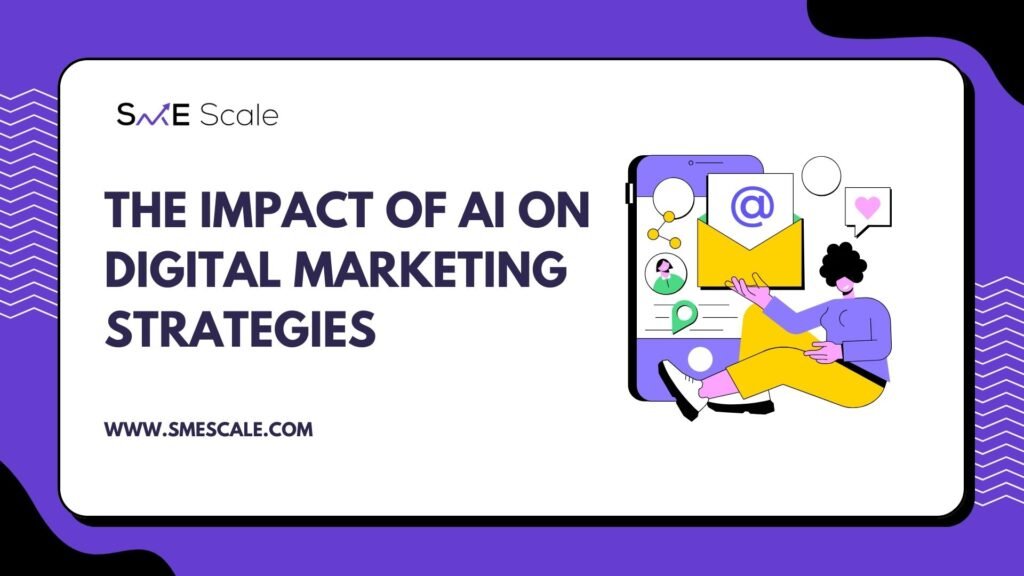The Impact of AI on Digital Marketing Strategies: A Case Study on Transforming Customer Engagement

In today’s fast-evolving digital landscape, artificial intelligence (AI) is no longer just a futuristic concept. It has become a core driver of innovation, especially in digital marketing strategies. Businesses that adopt AI solutions are leveraging its power to optimize marketing campaigns, enhance customer engagement, and drive better returns on investment (ROI). At SME Scale, we recognize the importance of staying ahead of technological trends, especially when it comes to helping small and medium enterprises (SMEs) scale through smarter marketing strategies.
This blog explores the impact of AI on digital marketing, dives into a real-life case study, and explains the psychology behind how AI-powered solutions can drive digital success.
Understanding the Role of AI in Digital Marketing
AI’s role in digital marketing is multi-faceted. From automating customer segmentation to delivering personalized content and improving campaign performance through data-driven insights, AI empowers businesses to operate more efficiently and effectively. Here are some key ways AI is transforming the marketing landscape:
Personalization at Scale: AI analyzes vast amounts of consumer data to deliver hyper-personalized experiences. Through AI, marketers can send tailored messages to individual users based on their preferences and behaviors.
Predictive Analytics: By analyzing historical data and current trends, AI can forecast customer behavior, helping businesses plan targeted marketing campaigns that yield higher engagement rates.
Chatbots and Customer Support: AI-driven chatbots offer 24/7 customer service, reducing response times and improving overall user experience. These virtual assistants can answer common queries, guide customers through purchasing decisions, and even offer personalized recommendations.
Content Creation and Curation: AI can create simple content like product descriptions and social media posts, freeing up time for marketers to focus on more complex strategies.
Ad Optimization: AI algorithms are able to optimize digital ad campaigns by automatically adjusting bids, targeting the right audience, and testing variations of ads to find the best-performing version.
Real-Life Case Study: How AI Transformed Customer Engagement for an SME
Let’s explore a real-life example of how an SME leveraged AI to enhance its digital marketing strategy and drive growth.
Case Study: Company XYZ – Personalization at Scale
Background: Company XYZ, a growing e-commerce business, was struggling to manage customer interactions across multiple digital channels. Their marketing efforts were inconsistent, and customers were receiving generic messaging that failed to resonate. This led to low engagement rates and high cart abandonment rates, which directly impacted sales.
Challenge: The company needed a way to better understand its customers and deliver more personalized, timely messages without overwhelming its small marketing team.
Solution: Company XYZ implemented an AI-powered marketing automation platform that used machine learning algorithms to analyze customer behavior across web, email, and social media channels. The AI platform segmented customers based on purchase history, browsing patterns, and interactions with the brand.
Using this AI solution, XYZ was able to:
Send personalized email campaigns that recommended products based on a customer’s previous purchases.
Use predictive analytics to identify at-risk customers and send them targeted offers to re-engage.
Implement dynamic content on their website, where product recommendations changed in real-time based on user behavior.
Results: After six months, the company saw a 35% increase in email open rates, a 50% reduction in cart abandonment, and a 20% boost in overall sales. The AI solution had successfully delivered personalized experiences at scale, allowing the company to grow without significantly increasing the marketing team’s workload.
The Psychology Behind AI-Driven Marketing Success
The success of AI in digital marketing isn’t just about advanced technology—it’s deeply rooted in understanding human psychology. Consumers crave personalized experiences, and when they feel that a brand understands their needs, they are more likely to engage and convert.
1. The Power of Personalization
AI taps into the psychological principle of personalization. When consumers see content or offers tailored specifically to them, it activates the reciprocity effect—the feeling of wanting to give something back. In marketing, this leads to increased customer loyalty and higher conversion rates.
2. AI and Decision Fatigue
AI helps combat decision fatigue, a psychological state where consumers become overwhelmed by too many choices. By offering tailored recommendations, AI simplifies decision-making for customers, making it easier for them to complete their purchase without feeling overwhelmed.
3. Building Trust with AI-Driven Chatbots
The use of AI-powered chatbots enhances the user experience by providing instant, personalized support. From a psychological perspective, faster response times increase customer satisfaction and trust in the brand, as customers feel their needs are being prioritized.
4. Predicting Behavior to Build Relationships
Predictive analytics in AI helps marketers anticipate customer needs and deliver solutions before the customer even realizes they need them. This proactive approach builds stronger emotional connections with customers, driving loyalty and repeat business.
Conclusion: The Future of AI in Digital Marketing for SMEs
At SME Scale, we believe the integration of AI in digital marketing strategies is not just a trend but the future of customer engagement. For SMEs, the use of AI offers an opportunity to scale marketing efforts, improve customer experiences, and stay competitive in the market. By understanding the psychology behind consumer behavior and leveraging AI tools, businesses can create more impactful marketing strategies that resonate with their audience.
As demonstrated by Company XYZ, AI can be a game-changer when used strategically. Whether it’s personalizing marketing messages or predicting customer behavior, AI provides small businesses with the power to compete on a larger scale—without requiring a massive marketing team or budget.

